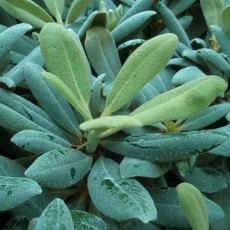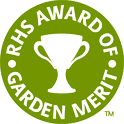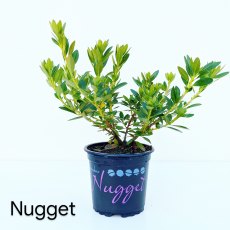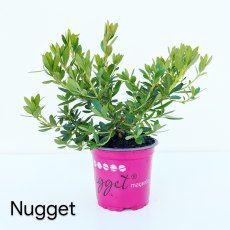Kalmia latifolia 'Olympic Fire'
Item: KALOF
 In stock
In stock
May-June
Light Pink
100-125cm
Not Scented
No
To -20 °C
Collect in Store
This item is available for collection.
Home Delivery
UK mainland delivery from £8.95
Rich red buds opening to soft pink almost white octagonal flowers in late May early June. This variety has a slightly more upright habit than some. The new foliage is a glossy green with a slight wave to the edge of the leaves.
Kalmias are a medium sized evergreen shrub from south-eastern USA and Asian mountains where they typically grow under the canopy of tall trees. They are an under used shrub which start flowering at the end of May going on well into June extending the flowering season of most gardens. Kalmia’s come in a variety of colours from red to pink through to burgundy and out to white, with many two-tone options.
• Ideal for containers and small gardens.
• Ideal position: fully sun to partial sun
• Ideal soil: pH 4.5 to 6
• Habit: slow growing compact
• Bred by: John Eichelser
• Hybridization date: pre 2000 (1966).
• Origin: Unkown
• Parentage: A seedling from Kalmia ‘Ostbo Red’
Customer Reviews

Good to know
We offer a range of our favourite plants which associate well with rhododendrons. They all like similar growing conditions – moist acidic soil and dappled shade. Some of these are featured in our garden at Crosswater Farm, and often create plenty of interest and enquiries. Many are fairly rare and are unavailable elsewhere, but deserve to be better known.
All require good moist acidic soil with a high organic content, planted with good ericaceous compost. For a guide to plant spacing, use the height we give in 10 years as a guide to the distance between each plant. Plant no deeper than the top of the rootball, and dig in plenty of good ericaceous compost around the sides. A teaspoon of slow release feed is sufficient for a 3 litre plant, rising to a small handful for a mature plant.
For further advice, For further advice, see here
The Basics
Ideal soil
Acidic soil, good organic content, pH 4.5-6.0. Inkarho range of rhododendrons will tolerate soils up to pH7.5
Sun or Shade
Light dappled shade is best for most varieties.
Shelter
Refer to hardiness rating. Give young plants protection.
Site Selection
Avoid close to trees, roots, invasive weeds, walls, hot patios, dry banks and waterlogged soils. Do not use weed matting or stone mulch.
Plant spacing
Use the height shown in 10 years as a guide to the distance between each plant. Allow room for plant to fill out. If planting closer for instant impact, be prepared to move plants after a few years.
Compost
- 3 litre pot, dig in 10-20 litres of ericaceous compost.
- 7.5 litre pot, dig in 20-30 litres of ericaceous compost.
- 70-80cm specimen, dig in 60 litres of ericaceous compost.
- 100-120cm specimen, dig in 120 litres of ericaceous compost.
Planting depth
Plant high in the ground, with the top of the rootball visible.
Feeding
Slow-release ericaceous feed recommended in March and straight after flowering.
Mulch
Recommended every few years.
Water
The key ingredient! Keep moist all season, especially the critical time at end of June for flower bud initiation. Tap water is better than no water. Heavy dose at least once per week in dry weather.
Drainage
Ensure good drainage in winter, especially with yellow flowering varieties. Avoid waterlogged sites.
Pruning
Rhododendrons and Camellias: Not normally required. Tidy wayward shoots after flowering.
Evergreen azaleas and Bloombux can be clipped into a low hedge.
Magnolias and Acers: Formative pruning when young to shape into a tree or bush.
Deadheading
Remove old flower-heads, particularly on young or weak plants.
For further advice see here
Size Guide
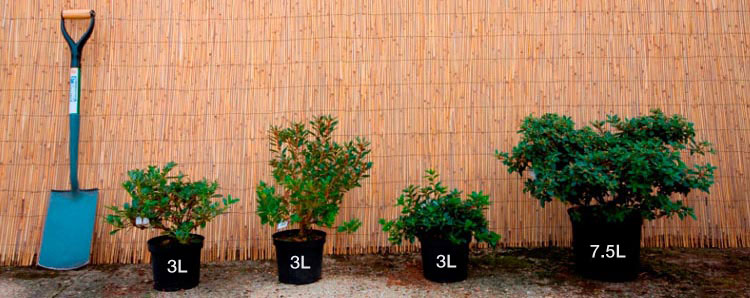
Delivery & Returns
Our website calculates the delivery charge according to weight and delivery location throughout the UK. To see these charges, please enter your postcode at the checkout, and you will see the charge vary as you add more items to your wheelbarrow.
 Millais Nurseries
Millais Nurseries



